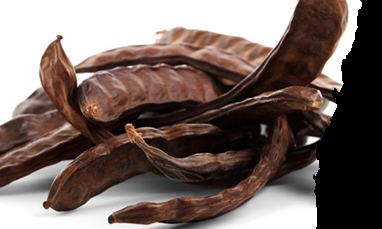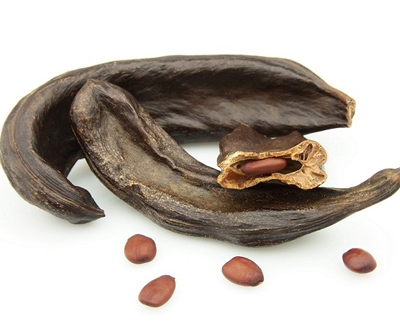Carob wholesale rightly been coined the healthy alternative to chocolate. As most of us are now aware, carob is free from the stimulants caffeine and theobromine found in chocolate. It is also naturally sweet, so carob products will generally contain substantially less sugar than their chocolate counterparts. Carob powder can be substituted for cocoa powder in any recipe. Carob is also available in bars, drops and in confectionery. Medicinally, carob wholesale is used for digestion problems including diarrhea, heartburn, and the intestine’s inability to properly absorb certain nutrients from food. These absorption disorders include celiac disease and sprue.
Carob’s tannin content also inhibits bacteria, and can stop certain toxins and free-radicals in their tracks, inactivate them, and get the body to discard them. A research study, using carob powder wholesale with babies for bacterial or viral diarrhea, showed recovery within 2 days. Babies treated with conventional medicine took almost twice as long to recover. The babies given carob also regained normal temperature and body weight quicker. The high fibre content of carob, together with the pectin, makes the stomach contents more glutinous, thus deterring the back-flow of acid in the throat.
Carob is a healthy substitute for chocolate that is lower in calories. Roasted carob wholesale is naturally sweeter, (or not as bitter), as unsweetened chocolate, so it can be made palatable with less added sugar in recipes. Carob has a number of advantages over chocolate: it is hypoallergenic, and hypoglycemic. 1 The true trick to enjoying carob is to not expect it to taste exactly like chocolate,(and be forever disappointed), but to learn to appreciate carob for its own unique taste.Carob is frequently used as a chocolate substitute in baking and in sweets, although it is not from the same plant. Harvested from bean-shaped pods, this sweet food is grown around the world, according to Purdue University. Carob is most commonly made into carob flour, which is similar in appearance and texture to cocoa. Whole pods are sometimes processed to make a syrup used in commercially produced foods, including baked goods, carob chips, ice cream and carob-covered fruits such as raisins. Carob is rich in a number of nutrients and antioxidants, and may help lower cholesterol levels.
Carob wholesale has been used by man as a food for thousands of years and has been called, ‘the staff of life’, ‘universal provider’, ‘bread that grows on trees’, all of which signify the importance carob has had. It is filling, nutritious, and easily digested, and is an alkaline forming food (pH 10.6), which makes it valuable for reducing excess stomach acidity.Substitute carob chips for chocolate chips in cookies, bars, cakes, muffins and candies. (Many of our stores carry unsweetened carob chips,too.)
Carob comes from the pod of a tree that grows along the Mediterranean Sea. The pod contains a sweet, edible pulp. Once dried and roasted, the pulp is ground into a powder called carob wholesale (but more commonly referred to as "carob powder"). It's similar to cocoa powder in color and can be substituted one-for-one in recipes, but carob is unique with its own special flavor and texture. {C}{C}If you've never tried carob, you're in for a treat. It's sweet, mild and packed with pectin, a soluble fiber. Traditionally, it was used to soothe an upset stomach.
Carob is free from caffeine and theobromine which can be addictive and can cause allergies. Caffeine and theobromine are stimulants. Caffeine is the most active and works directly on the brain stimulating the senses, inspiration and alertness. It can be transmitted through breast milk and pregnant women are advised to restrict their caffeine intake. Caffeine has analgesic properties but also has side-effects such as anxiety, nervousness, nausea, wholesale and palpitations. Caffeine not only stimulates the brain and other organs but also increases the heart rate. It can provoke emotional reactions. It stimulates the gastric juices and acts as a diuretic and so can cause excess loss of the water soluble vitamins B & C. Caffeine stimulates release of the body's stored energy reserves, meaning that sugars are released into the blood. This can increase the risk of diabetes and possibly obesity and can cause mood swings.





